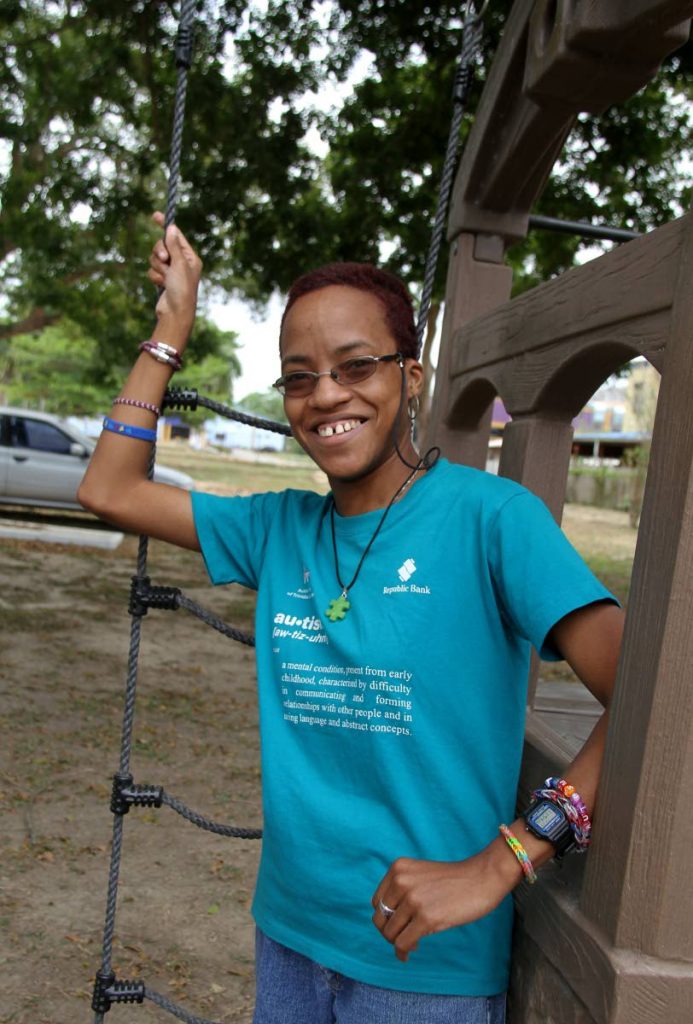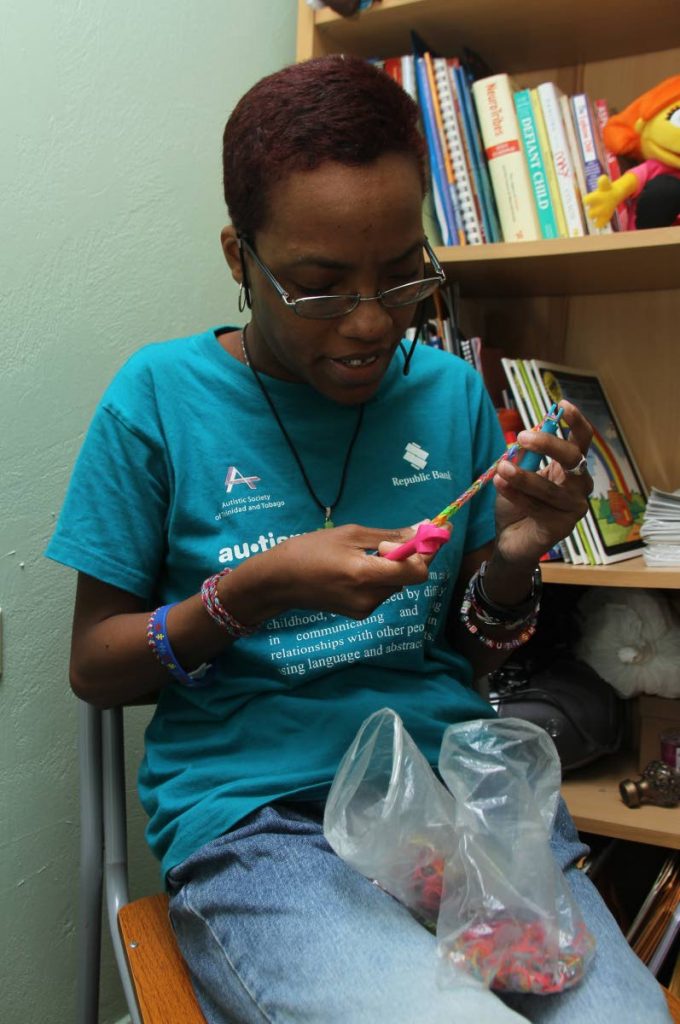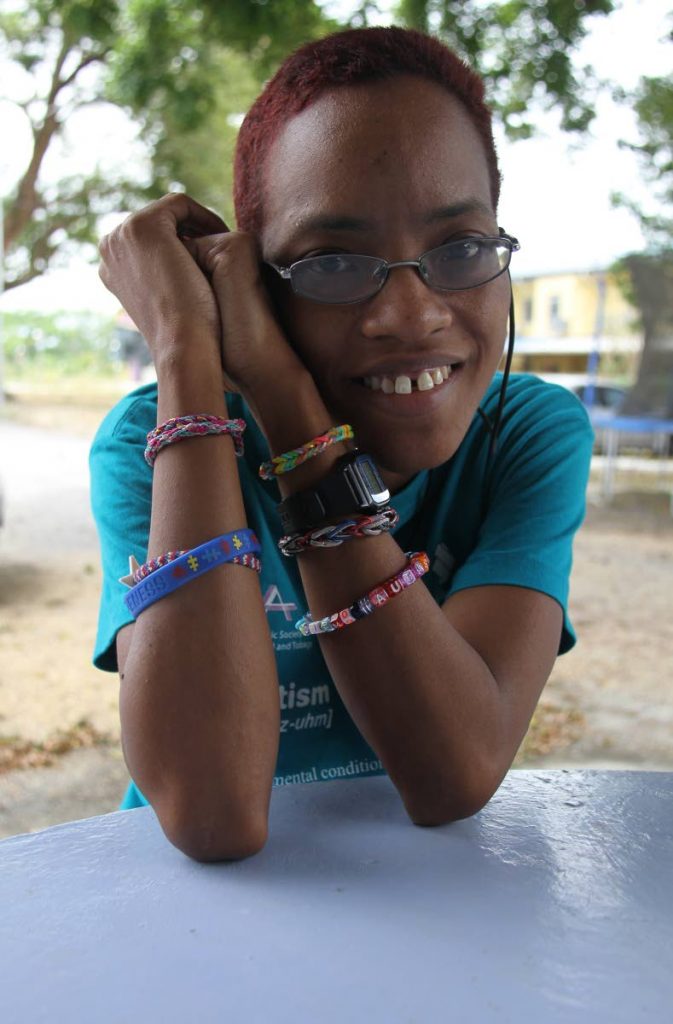Deana’s secrets

Deana Julien has perfect pitch and a deep love of music. She plays the keyboard, violin and tenor pan, and performs for several ministries at Faith Assembly International in Arouca.
She also has Asperger syndrome, a developmental disorder which is one of the autism spectrum disorders.
Deana, 35, has been playing the keyboard since before she was a year old. She also had an affinity with pan. Her mother, Penelope Julien, told Sunday Newsday Deana took lessons at her secondary school during the August vacation and she discovered Deana could play the pan when she had to pick her up from one of those classes.
Deana was waiting for her and, after asking another student, was directed to the music room.
Penelope said, “As I was walking up the steps I heard a pan playing. When I got there, I saw the pan teacher and told him I was looking for Deana. Her back was turned, so I didn’t see her, but he pointed to the girl playing. “After she finished I told her, ‘But you didn’t tell me you could play pan,’ and she said, ‘Shhh. It’s a secret.”
She learned to read music at school and later learned music theory from Penelope’s cousin Maureen Clement.

Penelope said Deana started playing the violin four or five years ago when she used to “run away” to a music school near their home to watch the students learn. She was told Deana just picked up the violin, held it perfectly, and started to play by ear. After that, she joined the class.
In addition to playing the keyboard at her church, Deana also played at funerals, in a parang group, and with several guest gospel artists at the church over the years. She said she attended music class at the Angelic Sounds Music Centre and would like to teach autistic people music.
“I have already worked with a couple of autistic children at the music centre , where I taught them violin and to count beats. Mr Gideon Ovid (the centre’s owner) assisted me.”
Public school
Penelope told Sunday Newsday she did not know her daughter had autism until Deana was eight. She noticed Deana would not mingle with the other children in kindergarten and preferred to sit with the “aunties.” When she attended primary school, some of the teachers noticed some of Deana’s behaviour was odd.

A psychologist visited the school – Deana was eight at the time – and the teachers suggested Penelope meet with him, as she was going through a period of depression. She made an appointment and took Deana with her.
“When we went he said to me, ‘You know your daughter is mildly autistic?’
“I had no idea what that was. He tried to explain autism to me and I asked if there was any way I could get help for her, but he couldn’t direct me to anyone.”
Penelope never sent Deana for a formal evaluation, but continued to treat her daughter like any other child.
It was years later, when Deana was in her late 20s, that Penelope’s cousin called her with a number for the Autistic Society of TT. There she learned Deana had Aspergers and got advice on how to deal with her daughter. She said the parent support group taught her a lot and now she had more patience with Deana, especially during her tantrums.
Deana’s school life was not simple. In fact, the memories seemed to be disturbing, as Deana covered her ears when Penelope spoke about the bullying she suffered in school from the second year of primary school to Form Two in secondary school.
Her mother said Deana never told her about the bullying, and she only found out from one of Deana’s former classmates after she left primary school that, from second year, other children stole Deana’s snacks and pushed her around. Worse, it wasn’t just the children, either.
“One time some of them took her snacks, put grass in a bowl and told her it was for her to eat...Another time, one teacher gave Deana 40 lashes for not doing some work.
“That same day another of Deana’s friends said she had to tell me about what the teacher did. Some of the other children even offered to take the licks for her, but my daughter never said a word.”
Deana was also bullied in secondary school. Penelope said one girl in particular constantly locked Deana in the toilet, pulled her hair, which was very long at the time, cursed her, pelted her with chennette seeds and more. Again, Deana did not tell her of the problems she was having at school.
However, in Form Two, a classmate of Deana’s could not continue to watch the quiet and polite girl being harassed and told Penelope about the bullying one morning when she dropped Deana to school. That afternoon Penelope had a chat with the bully and she left Deana alone from then on.
Unfortunately, some of the teachers also made things uncomfortable for Deana. Penelope recalled one teacher asking if Deana needed psychiatric help and she had to tell him her daughter was autistic.
Deana said the bullying was the worst part of school, but the best was during her first and second years of primary school.
“I liked a teacher called Mrs Gonzales. She said that I would be a leader because I had leadership qualities.
“I also liked a teacher called Miss Charles. We used to read the Bible and also beat the table like drums... I loved lessons with Miss Sharon Gordon. I miss her a lot.”
Deana did reasonably well in school up to Form Three. But as the work got harder it was more difficult for her to understand. Even during this interview, when she was questioned, Deana sometimes turned to her mother and asked her to “break it down.” She also started to lose her hair from stress, especially when she thought about exams. Even so, during her secondary school career, she won awards for Spanish, punctuality and regularity, and uniformity.
Penelope’s miracle
Deana was born when her mother was 17. Penelope described Deana as her miracle for several reasons, including the fact that she did not realise she was in labour because she had no pain, Deana was born prematurely at seven months and two weeks, weighed 2.2 pounds at birth, and her heart stopped twice while she was in the incubator.
In addition, Penelope said she changed a lot for the better because of Deana. She said Deana used to watch a religious programme called Explosive Faith on television and around 2006 started to attend the Faith Assembly to pray for her mother. Penelope said she used to be more aggressive, was a party person and had several negative qualities which she changed because of Deana and, about a year later, she too started attending church.
She noted that autistic people observed and understood things even if they could not communicate them. And Deana had strong moral and religious standards.
Penelope could not be more proud of her daughter and her accomplishments.
“I am very, very proud of my daughter. I want to tell parents of autistic children and children with disabilities: Do not feel sorry for yourselves. You have been chosen by God to take care of His special children. No matter what you face in life, trust in God, keep a smile on your face. With God all things are possible.”
Another of those accomplishments was her knack for making jewelry. Deana said she started making bracelets about two and a half years ago, beginning with rubber bands and progressing to embroidery thread.
“I make bracelets which I bless people with, and they in turn bless me with money. God told me to use this gift that I have...I like it because it’s fun, especially when you’re sitting around doing nothing.”
In addition to her class at the music centre and classes at Autism Place in D’Abadie on Fridays, Deana keeps herself busy on her laptop, though she said it was not working properly. She spent a lot of time looking for new ideas for her bracelets, listening to music, and writing “dialogues” (movie scripts or plays).
Deana said she liked watching movies based on true stories, especially those with singing and dancing, loves musicals and “old school” movies, and enjoys both American and local music, especially Machel Montano. She’s working on 15 “dialogues” at the moment and trying to make two of them into movies.
Deana also plans to continue learning, teaching, and experiencing new things. She said her dream was to go to New York to spend time with family and friends.
“I am learning Japanese on YouTube. There’s a TV show I saw where I’m learning a few words in Japanese, and I have friends on Instagram that speak Japanese too so I’m learning it.
“And I’m learning a little bit of Hindi from music from our country or Indian movies. I recognise some words. I’m a fan of Shah Rukh Khan.”
Deana would also like to educate people about autism.
“Autism is not a disease. Don’t try to cure it, try to understand it...There are only two things I can say to all autistic people: Put God first. Don’t give up on your dreams.”


Comments
"Deana’s secrets"